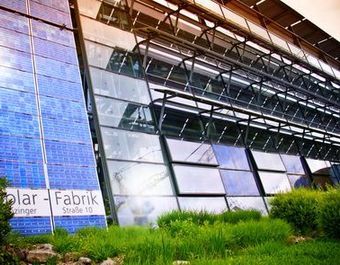 Pictured:
Solar-Fabrik, a solar panel manufacturer in
Freiburg, Germany that in 1999 became the first
CO2-neutral factory in Europe. Germany has gone
farther than any other large industrial economy in
decarbonizing its power sector, but it has a lot of
work left to do, according to a new progress report
by the International Energy Agency. Credit: Osha
Gray Davidson for InsideClimate News
Pictured:
Solar-Fabrik, a solar panel manufacturer in
Freiburg, Germany that in 1999 became the first
CO2-neutral factory in Europe. Germany has gone
farther than any other large industrial economy in
decarbonizing its power sector, but it has a lot of
work left to do, according to a new progress report
by the International Energy Agency. Credit: Osha
Gray Davidson for InsideClimate News
BERLIN—The grand old building in downtown Berlin has seen some of the worst of German history: aerial bombing in World War II, a close-up view of the Berlin Wall, service as communist East Germany's highest court. But on May 24 an ornate conference room in the Ministry of Economics and Technology served as the setting for the delivery of a report card on a new and more hopeful chapter in Germany history: the country's ambitious effort to run its economy on non-polluting energy.
Germany has gone farther than any other large industrial economy in decarbonizing its power sector. Already it derives more than 20 percent of its electricity from clean sources, and it's aiming to reach 80 percent by 2050. But the sheer scale of its Energiewende, or "energy transition," has caused skeptics here and abroad to question whether those goals are really attainable.
At a well-attended press conference that morning, the director of the International Energy Agency delivered her organization's verdict: Germany has a lot of hard work left to do, but could make the grade by surmounting three major obstacles: the rising cost of electricity to consumers, a failed market in CO2 emissions permits issued by the European Union, and an overreliance on coal that could set emissions-reductions goals back for years.
Read the story of Germany's "Clean Break" with coal, oil and nuclear energy as a Kindle Single ebook on Amazon for 99 cents.
The IEA is an independent analytical think tank, based in Paris, whose opinions hold a lot of weight. Previously the organization had voiced doubt about Germany's decision, made after the Fukushima disaster of 2011, to end its use of nuclear power while sticking to its plan to switch off fossil fuels. The release of the IEA's new progress report provides a much-needed opportunity to assess how this voyage into uncharted waters is going. Given Germany's pioneering status in the realm of energy, it's a discussion that could one day be in the future for American voters and lawmakers.
The report emphasizes that Germany has exceeded even its own ambitious targets for the production of electricity from renewable sources without damage to its economy. In fact, renewable electricity technology has itself become an important economic engine.
"Since our last review Germany has successfully developed its long-term energy strategy," said IEA director Maria van der Hoeven. "Germany has successfully decoupled its emissions of greenhouse gasses from its economic growth. The country has ambitious, long-term goals in energy and in climate. I salute that."
Germany has reduced its overall emissions in large part through what van der Hoeven called a "massive buildout" of decentralized, renewable energy sources, particularly solar panels. She also praised a number of steps Germany has taken at the federal level, such as phasing out subsidized hard-coal mining, providing a steady flow of funding for energy conservation projects, and streamlining the construction of the new transmission lines needed to distribute inherently variable inputs of renewable electricity.
At the same time, however, van der Hoeven called for reform of Germany's landmark Renewable Energy Act (EEG) of 2000, which was the most critical single step in Germany’s move toward renewables. That law, which has already been amended several times, gives producers of renewable electricity guaranteed access to the transmission grid. It also regulates the country's feed-in tariff, which pays those producers, including people who generate energy by fitting their homes with solar panels or other technology. The tariff is so popular that people all over the country have installed solar panels and the landscape is increasingly dotted with wind turbines. But it is funded through a surcharge on consumer electric bills, leading to higher prices for those who can't produce their own energy.
The IEA's message is likely to find ready listeners in Berlin, even if it is unlikely to result in quick changes. Germany is facing a federal election on September 22. Although most observers agree the EEG needs to be updated, no significant changes are likely to be implemented before then. But the recommendations will likely fuel a lively debate about how to better distribute the costs of Germany’s dramatic change of course.
German environment minister Peter Altmaier of the ruling Christian Democratic Union caused a stir earlier this year when he predicted that the Energiewende's overall cost might reach $1.3 trillion by 2040. Arguing that rising costs threaten to derail public acceptance of the effort, he proposed freezing the consumer surcharge. It currently stands at about 7 cents per kilowatt-hour, or about 20 percent of overall consumer electric bills.
Many renewable energy advocates say the cost controversy amounts to election-year hype. But the uncertainty about electricity costs has plagued developers of renewable energy projects, which have been subsidized by the surcharge. Along the North Sea coast, for example, development of planned offshore wind parks has slowed dramatically, with some manufacturers laying off hundreds of employees.
"Many investors have shied away because of uncertainties about the future," said Jan Rispens, director of the industry association Renewable Energy Hamburg, in an interview at his office. "Our energy market really isn't functioning anymore. The Renewable Energy Act has to change. It's been a wonderful and good instrument for when there's relatively little renewable energy in the grid. But it doesn't function so well now that there's more renewable capacity."
At the Berlin meeting where the IEA report was unveiled, the German state secretary for economy and development, Stefan Kapferer, said federal officials are well aware that legislative changes are needed. "That process can't take place in the few months before the election," Kapferer said, "but the agenda for the period after the election will certainly include the need for a fundamental reform of the EEG."
The IEA report also calls on German officials to be more proactive in working toward international reform of CO2 permit prices. The permits, issued throughout the European Union, are supposed to make it expensive for industries to emit CO2, thereby incentivizing the development of alternatives. But permit prices are so low that coal and other fossil fuels, whose burning releases a lot of CO2, remain economically competitive in Europe.
Renewable energy advocates have proposed a short-term fix for this problem through a "back loading" plan that would raise permit prices by limiting their supply. In April European Parliament members narrowly rejected the plan. In early May German Chancellor Angela Merkel called on the Parliament to support it, though her own Minister of Economics and Technology, Philipp Rösler, has so far not lent his support. The European Parliament’s environment panel is scheduled to take up the issue again on June 19, with a full Parliament vote expected in early July.
German officials should push the plan harder than they have, said Felix Matthes, director of the Berlin-based Institute for Applied Ecology, in a phone interview. "The German government needs to give a clear signal that it will support the back loading plan," he said. "It's a shame that they haven't yet stated that clearly enough."
However much the IEA report calls for reform of the EEG and the need for higher CO2 permit prices, the report makes it clear that Germany is building on a position of strength as it wrestles with the challenges of switching to renewables. One of Germany's greatest resources, van der Hoeven noted, is neither economic nor a traditional energy source—rather, it is the remarkable degree of consensus that the country has achieved on its exit from nuclear energy and its desire to turn away from fossil fuels.
"Without such a consensus, a zigzag course in energy politics would not be unlikely," van der Hoeven said, "and that would significantly damage the investment climate in the energy economy."

© InsideClimate News